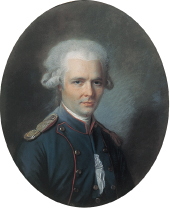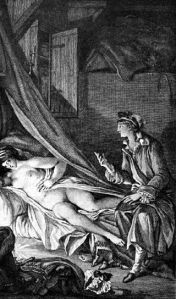 Today is the birthday of Pierre Choderlos de Laclos who was born in Amiens, France in 1741. He was a soldier and a freemason. Neither of those sound very interesting, but Pierre liked to write in his spare time. He wanted to: “write a work which departed from the ordinary, which made a noise, and which would remain on earth after his death.” If you’ve not heard of him, you might be wondering if he achieved this. But for a long time he was considered to be as scandalous a writer as the Marquis de Sade. He is best remembered for his novel ‘ Les Liasons Dangereuses’.
Today is the birthday of Pierre Choderlos de Laclos who was born in Amiens, France in 1741. He was a soldier and a freemason. Neither of those sound very interesting, but Pierre liked to write in his spare time. He wanted to: “write a work which departed from the ordinary, which made a noise, and which would remain on earth after his death.” If you’ve not heard of him, you might be wondering if he achieved this. But for a long time he was considered to be as scandalous a writer as the Marquis de Sade. He is best remembered for his novel ‘ Les Liasons Dangereuses’.
 It is an epistolary novel, which is just a way of saying that it is presented as a series of letters. The two central characters are a pair of wealthy, jaded aristocrats, the Marquise de Merteuil and the Vicomte de Valmont. They are two truly awful people who set out to corrupt the innocent and generally toy with the lives of others for their own amusement. As you might imagine, it doesn’t turn out very well for anyone.
It is an epistolary novel, which is just a way of saying that it is presented as a series of letters. The two central characters are a pair of wealthy, jaded aristocrats, the Marquise de Merteuil and the Vicomte de Valmont. They are two truly awful people who set out to corrupt the innocent and generally toy with the lives of others for their own amusement. As you might imagine, it doesn’t turn out very well for anyone.
The book is made up of a series of letters, written by the characters to each other. Most of the characters are very open and honest. This is not the case with Merteuil and Valmont, the letters they write to others are very different from the letters they write to one another. It is in this way that their manipulations and duplicity is revealed to us.
The novel was published in 1782, just seven years before the beginning of the French Revolution. In hindsight, it’s easy to see it as an exposure of the decadence of the aristocracy and it was certainly seen as very scandalous at the time. However, we’ll never know if Laclos intended it to be a morality tale. His book was actually very popular with the aristocracy. Marie-Antionette loved it. It sold over 1,000 copies in the first month and ran to ten editions over the following two years.
It’s hard to see the novel as completely against the Ancien Régime when all the characters are aristocrats. When neither the protagonists nor their victims exactly come out on top, it’s hard to see at as anything else but an amoral tale. But Laclos did seem to manage to dance a fine line between the approval of the aristocracy and of the revolutionaries. He left the army for a time to work for Louis Philippe, Duke of Orléans who ran a terribly decadent outfit at the Palais Royal in Paris which he opened to the general public. Louis tried, but failed to win the hearts of the French people and was eventually beheaded in 1793. Laclos is rumoured to have been behind the Women’s March on Versailles. A protest against the high price and scarcity of bread which was a significant event in the early days of the Revolution. He was also present at the Storming of the Bastille. He not only survived the Revolution but managed to be accepted into Napoleon’s army in 1800 and was made a general.
So, was he a true revolutionary or did he secretly enjoy the scenes of decadence he witnessed among the elite? I know he made several speeches in favour of the education of women, though I haven’t been able to find the text, so he was not entirely like his Vicomte de Valmont. On the other hand he survived, even thrived in post-revolutionary France, so perhaps he could be as cold and calculating as his Marquise de Merteuil.